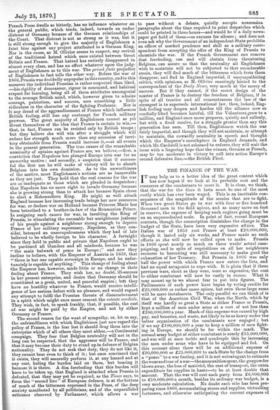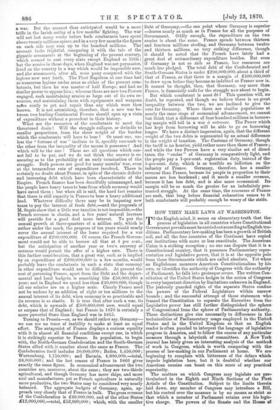THE FINANCE OF THE WAR.
IT may help us to a better idea of the great contest which has now begun if we look at its probable cost and the resources of the combatants to meet it. It is clear, we think, that the war for the time it lasts must be one of the most costly which has ever been waged. This is an inevitable con- sequence of the magnitude of the armies that are to fight. When two great States go to war with four or five hundred thousand men in the field apiece, and as many more on foot in reserve, the expense of keeping such engines going must be on an unprecedented scale. In point of fact, recent European contests, though the conscription diminishes the charge in the budget of the State, have been very expensive affairs. The Italian war of 1859 cost France at least £20,000,000, though it lasted only six weeks, and France made no such efforts as she will now be called upon to make. Prussia in 1866 spent nearly as much on three weeks' actual cam- paigning, and in spite of requisitions on all her neighbours recourse to borrowing was still necessary to make good the exhaustion of her Treasury. But Prussia in 1866 was only half the power with which France now enters the lists, and had no equal antagonist to cope with. It is plain that if these previous wars, short as they were, were so expensive, the cost to either combatant will now be vastly in excess. What it may mount up to we almost fear to put into figures. The Parliaments of each power have begun by voting credits for £25,000,000 or rather more apiece, but even these large sums will be mere instalments. The only parallel we can think of is that of the American Civil War, when the North, which by itself was hardly so great a State as either France or Prussia, kept a million of men under arms at a cost of not less than £200,000,000 a year. Much of this expense was caused by high pay, and bounties, and waste, not likely to be so heavy under the better organization of the combatants now engaged ; but if we say £100,000,000 a year to keep a million of men fight- ing in Europe, we should be far within the mark. The normal army budget of either combatant is nearly £15,000,000, and war will at once treble and quadruple this by increasing the men under arms who have to be equipped and fed. On this account alone there will be an additional expense of £20,000,000 or £25,000,000 to each State by the change from a "peace" to a war footing, audit is not extravagant to estimate the wear and tear of a war—the ammunition spent, the gunpowder blown away, the loss of materiel, the cost of transport, the extra expenditure for supplies in haste—to be at least double that amount. That the war will cost each party from £6,000,000 to £10,000,000 a month, besides its ordinary war budget, is a very moderate calculation. No doubt each side has been pre- paring since 1866, accumulating stores and supplies, victualling fortresses, and otherwise anticipating the current expenses of a war. But the amount thus anticipated would be a mere trifle in the lavish outlay of a few months' fighting. The war will not last many weeks before both combatants have spent above twenty millions apiece, and in a very few months the figure on each side may sum up to the hundred millions. The account looks frightful, comparing it with the tale of the gigantic armaments at the beginning of the present century, which seemed to cost every state except England so little ; but the armies in those days, when England was not paymaster, lived on the country in a way which would be impossible now, and he armaments, after all, were puny compared with the legions now sent forth. The First Napoleon at one time had as numerous legions under arms as either of the present com- batants, but then he was master of half Europe, and had no similar power to oppose him ; whereas there are now two Powers engaged, each maintaining armies as large out of its own re- sources, and maintaining them with equipments and weapons mere costly to get and repair than any which were then known. It is not astonishing, therefore, that a new war be- tween two leading Continental Powers should open up a vista of expenditure without a precedent in their history.
What are the resources of the combatants to meet the threatened drain ? Will the struggle collapse, or dwindle to smaller proportions, from the sheer weight of the burden which the combatants will have to bear ? Or must one, un- less the "fortune of war" inclines to it, speedily succumb to the other from the inequality of the means it possesses ? And which will be the one ? These are all questions which can- not fail to be put, and we do not think the answer is re- assuring as to the probability of an early termination of the struggle. Both powers are good for many months' war, even at the tremendous rate of expenditure involved, There is certainly no doubt about France, in spite of the chronic deficits and increasing debt which have been characteristic of the Empire. French finance has been dreadfully mismanaged, and the people have heavy taxes to bear from which economy would have saved them ; but when all is said, the hard fact remains that there is still capacity in France to bear a heavy additional load. Whatever difficulty there may be in imposing new taxes to pay the interest of fresh debt,—and the proposals of M. Segris show that a little war taxation is not impossible,—the French revenue is elastic, and a few years' natural increase will provide for a good deal more interest. To put the annual growth at three-quarters of a million only, which is rather under the mark, the progress of ten years would nearly cover the annual interest of the loans required for a war expenditure of £200,000,000. Of course, the French Govern- ment would not be able to borrow all that at 4 per cent., but the anticipation of another year or two's recovery of revenue would permit the offer of a higher rate. There is this farther consideration, that a great war, such as is implied by an expenditure of £200,000,000 in a few months, would probably leave the combatants in such a state that economy in other expenditure would not be difficult. At present the cost of governing France, apart from the Debt and the depart- mental and local budgets, is something like £50,000,000 a year; and in England we spend less than £40,000,000, though all our salaries are on a higher scale. Clearly France need not be undone by an addition of eight or ten millions to the annual interest of its debt, when economy is so practicable and its revenue is so elastic. It is true that after such a war, its debt, which is upwards of £500,000,000 now, would equal or surpass that of England ; but France in 1870 is certainly a more powerful State than England was in 1815.
Turning to Prussia—or, as we should rather say, Germany— we can see no trace of inability to make at least an equal effort. The antagonist of France displays a curious equality with it in almost all financial conditions except one, in which it is strikingly superior to France. In population, to begin with, the North-German Confederation and the South-German States allied with it number about the same as France. The Confederation itself includes 30,000,000; Baden, 1,450,000; Wurtemburg, 1,750,000; and Bavaria, 4,800,000,—total, 38,000,000; and the last census of France in 1866 gives exactly the same figure. In economical advancement the two countnes are, moreover, about the same ; they are two-thirds agricultural, and though Germany has more ships, and more coal and manufactures, yet as French agriculture is naturally more productive, the two States may be considered very nearly balanced. The aggregate budgets of Germany, again, ap- proach very closely that of France in bulk. The gross revenue of the Confederation is £40,000,000, and of the other States £121000,000,—total, £52,000,000; which, with the smaller Debt of Germany,—the one point where Germany is superior —leaves nearly as much as in France for all the purposes of Government. Oddly enough, the expenditure on the two armies is about the same. France spends between thirteen and fourteen millions sterling, and Germany between twelve- and thirteen millions, no very striking difference, though it should be noted that the French have lately had a great deal of extraordinary expenditure besides. But even if Germany is not so rich as France, her resources are much less pledged. The total debt of the Confederated and South-German States is under £200,000,000, about a third of that of France, so that there is a margin of £400,000,000. to draw upon before they become as indebted as France now is. It cannot be thought, then, that Germany, any more than. France, is financially unfit for the struggle now about to begin. But which combatant is most fit? This question will, no- doubt, be repeated, and though we believe there is no great inequality between the two, we are inclined to give the vote for Germany. Where there are similar populations at nearly the same stage of economical advancement, we cannot but think that a difference of four hundred millions in borrow- ing margin will tell in a war a out rance. The Power which has kept from borrowing will be able to go on borrowing longer. We have a distinct impression, again, that the different weight of the two debts is represented by an actual difference- in the weight of taxation. The Customs of Germany, though the tariff is no heavier, yield rather more than those of France ;. and while the two Powers have a very similar set of direct- taxes, the " excise " of Germany is comparatively light, and the people pay a 1-per-cent. registration duty, instead of the- 5-per-cent. duty, which is so terrible an infliction on the- industry of France. Germany, therefore, has a smaller- revenue than France, because its people in proportion to their means are less burdened ; and it needs a smaller revenue, because it has less debt, and is also more economical. Its-- margin will be so much the greater for an indefinitely pro- tracted struggle. At the same time, the resources of France- are such, that long before financial exhaustion comes to it. both combatants will probably enough be weary of the strife.































 Previous page
Previous page